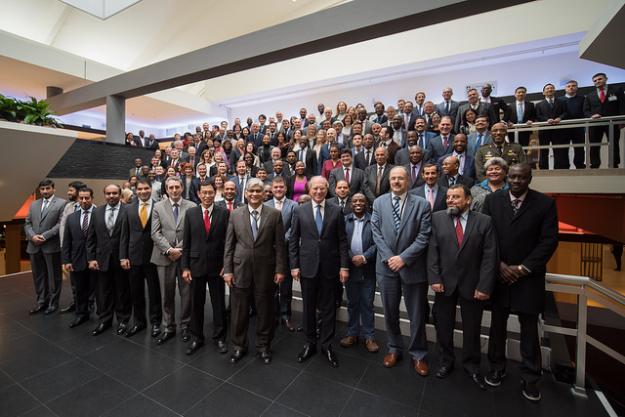
Participants at the Nineteenth Annual Meeting of National Authorities
THE HAGUE, Netherlands –28 November 2017– National Authorities (NAs) from 137 States Parties reviewed activities and shared best practices for the effective implementation of the Chemical Weapons Convention (CWC) at the Nineteenth Annual Meeting of National Authorities, held in The Hague from 22-24 November.
The Director-General of the Organisation for the Prohibition of Chemical Weapons (OPCW), Ambassador Ahmet Üzümcü, highlighted in his opening remarks that ‘’the Convention owes its success to the dedication of its States Parties and to the tireless efforts of their National Authorities. Indeed, your efforts guide and enforce what determines our success – namely, the implementation of the Convention within your national jurisdictions.’’
The Director-General further underscored the crucial role of National Authorities as “perpetually on the frontline of efforts to prevent re-emergence of chemical weapons” and how they “must directly tackle” new challenges.
The Annual Meeting provides National Authorities with a valuable platform to fulfil this task, by allowing them to share experiences and lessons learned, expand networks and deepen international cooperation.
Over the three-day gathering, more than 178 participants explored issues important to further effective and full CWC implementation such as: cooperation and engagement with chemical industry, identification of declarable activities; resolving discrepancies in cross-border transfer of scheduled chemicals (Article VI); receiving inspections (Article VI); capacity building programmes for national implementation (Article VII); assistance and protection against chemical weapons (Article X); and cooperation for economic and technological development (Article XI).
The attendees also discussed the future priorities of the Organisation, OPCW’s contributions to countering chemical terrorism, scientific and technological advances and ways to strengthen NA’s education and outreach efforts. For the first time at the NA Annual Meeting, attendees were able to discuss issues directly with representatives from chemical industry.
Beyond these topics, regional groups came together to discuss capacity building needs and ways to foster sub-regional and regional cooperation.
The meeting was also an opportunity for National Authority representatives to hold bilateral consultations with OPCW officials to address the ongoing challenges to CWC implementation and optimal ways of overcoming them.
The gathering was attended by participants from all five OPCW regional groups: Africa, Asia, Eastern Europe, Latin America and the Caribbean, Western Europe and other States. Additionally, representatives of the Caribbean Community (CARICOM), the Centre for Security Cooperation (RACVIAC), and the International Council of Chemical Association were in attendance.
Background
As the implementing body for the Chemical Weapons Convention, the OPCW oversees the global endeavour to permanently and verifiably eliminate chemical weapons. Since the Convention’s entry into force in 1997 – and with its 192 States Parties – it is the most successful disarmament treaty eliminating an entire class of weapons of mass destruction.
Over ninety-six per cent of all chemical weapon stockpiles declared by possessor States have been destroyed under OPCW verification. For its extensive efforts in eliminating chemical weapons, the OPCW received the 2013 Nobel Prize for Peace.
